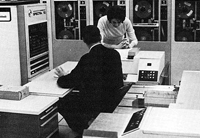
News and Events
We Used to Read Minds at Back To School

"How about a nice game of chess?" - the Joshua Computer, from "War Games."
This story comes to us from the "Old Timers" listserv, where retired Emory faculty, students, and staff can stay abreast of current events and reminisce about the old days:
I cannot recall exactly the year this occurred but I can say it was after we activated the Emory EUCC first terminal accessed (time shared) system. I believe the computer was an RCA Spectra 70/46, whose terminals were teletypes (not video). Look at Model 33 and you get the idea. Hard to believe there was a time when we were thrilled when we could access a computer using something as crude as a teletype.
Emory was very anxious to increase computer literacy because we saw "time sharing" as something that was important to undergraduate students (and humans in general). We had all heard about Dartmouth College which had a distinct emphasis at the time on teaching all undergraduates to program in Beginner's All-purpose Symbolic Instruction Code (BASIC). We had to try to keep up with Dartmouth.
We convinced the folks in charge of orientation that an introduction to computing should be part of freshman orientation week. We installed the teletypes in the library and allowed the incoming freshman to come to the room in small groups as part of the orientation. At this time in computing history, the general attitude on campus was indifference and even possibly hostility to what all this time-shared computer stuff was all about.
We needed to come up with something to interest to the incoming freshman, so we designed a menu of programs illustrating computing. One of the programs was named "Mind Reader." Written by one of the members of the team, here is the approximate dialog as I remember it:
Mind Reader Program (version 2.3)
Think of a number between 0 and 999 and type it in, but don't let me see it.
Awaiting response: 537 <--- USER INPUT
(COMPUTER PAUSES FOR ABOUT 10 SECONDS)
The number you had in mind is ... 537
Do you want to play again?
Awaiting response (Y/N):
Those of us on the team never got bored watching the incoming freshman select this program and how they responded. When they saw the phrase "but don't let me see it," there were two general responses:
- Some looked completely perplexed and ultimately typed in a number
- Some would try to hold their arm (or something convenient) over the keyboard in order to "hide" what they were typing
When the computer would type back the number most would show some degree of amazement, and would try it again and again. Very few of the incoming freshman would see right through the ruse, either because they had been previously exposed to computing, or they were just plain smart. Some of those ended up becoming student/employees of old EUCC. I am sure they know who they are. They are "old timers" today.
Great fun for those of us on the team and certainly a sweet memory for me.
- Brent A. Blumenstein, PhD, Emory Computing Staff Alumnus
Expanded Role For Service Desk Employees

Randy Phillips is enjoying his expanded role.
One of the major benefits of moving from Midtown to the North Decatur Building is that the Service Desk (SD) team members can take on expanded roles in OIT for the purpose of improving knowledge and adding valuable training for career advancement.
Currently, in addition to their regular Service Desk duties, Randy Phillips represents the SD by attending weekly CAB meetings, Geneva McCants is part of the Unified Messaging Project Team, Khalid Sharif is part of the Office 365 Project Team, and Athan Gillette serves as the SD Knowledge Champion and is working closely with Rose Harris and various teams on knowledge gathering, new process/application knowledge articles, communication and creating Reference Guides and OLA's. Additionally, Athan and Khalid participated in Back to School by assisting students with device configuration and connectivity as well as hands on computer assistance.
The Service Desk is currently in Training Mode for various new process/application and performing "job shadowing" with multiple UTS Tier 2 and Tier 3 teams. Job Shadowing allows a Service Desk Analyst to: 1) get an in-depth view of each team's role and responsibilities, 2) see how the services provided by the Service Desk impact other tiers, 3) refine troubleshooting knowledge and 4) promote teamwork and partnership. Teams in rotation were: Messaging, Desktop, Telephony, TOC and Field Services. Future rotations will be with Student Technology Service and ITSMO.
- Sharon Gregory, Manager, Service Desk